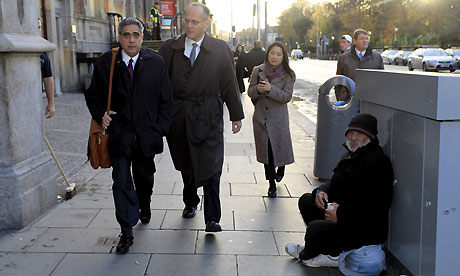I was back in Dublin over the weekend there, and while walking up O'Connell street a little incident occurred that taught me a lot about how the human mind works - or at least how my mind works. For those of you who don't know, O'Connell Street is the "Main Street" in Dublin, sort of like the Irish Champs Elyseé - although I don't think the Champs has an Ann Summers outlet, or Supermacs. In other words, O'Connell Street is where the ridiculously grandiose rubs shoulders with greasy tack.
It was realtively early on Saturday morning, but there was a fair smattering of people walking about, looking in the shops etc. About five metres in front of me, an old woman was shuffling along, wearing one of those all-enveloping blue rain-coats beloved of Irish grannies. As said granny struggled along the footpath, she passed a young Roma woman, babe in arms, whose free hand was extended to each passing pedestrian in turn, begging them for spare change (I know, I know, can I
really be sure she was a Roma? Isn't that just a tired stereotype, the Roma beggar? Maybe she was an investment banker who begs as a hobby on the weekend? For the purposes of this post, just take my word for it in any event.)
When this young woman caught sight of the shuffling granny, she made a bee-line for her. Nothing strange there, she attempted to intercept everyone who passed her by. But not only did she ask the granny for money - she began to follow her, pulling on her sleeve, and traipsing after her for a good 10 metres along the path. Remember, this granny was not hugely agile, it took her a long time to cover those 10 metres! And all the while, she had the beggar in tow.
Eventually, the pensioner ground to a halt and, defeated by the harassment, produced a purse from her handbag, ready to offer up a few coins in exchange for some peace. I contemplated stepping in or telling the beggar off - but I'm ashamed to say, my middle-class mind was immediately seized both by a ridiculous sense of liberal guilt (after all, why should I feel any guily? I had no problem with the race of the beggar - merely the harassment to which she subjected said granny) and by the usually intense Irish middle class fear of causing a scene (what if people start looking?!).
While I was wrestling with my own moral cowardice, a young woman stepped in, placed her hand gently on granny's shoulder, and quite politely told the beggar to go away. I applaud her dignified, quiet heroism, and am frankly still ashamed of the lack of backbone I displayed. As I retreated from the scene of my defeat, I began wondering how things would have played out had the aggressor not been Roma - would I have intervened if the beggar had been just another homeless Irish person? Would I have stepped in if the beggar had been an Irish Traveller?
The issue is clouded by the fact that, pathetically, I
really do not like making a scene. But it does raise the question of what is racism, and what are the legitimate demands that we place on immigrants? After all, is it not racist to give immigrants a carte blanche to engage in begging , a fundamentally dependant act from which they will most likely never wean themselves, and which represents the destruction of ambition? I do not think begging is of benefit to an Irish person - why should I accept that a foreigner can settle for it as an activity? And by refusing to stand up to bad behaviour from one individual from this immigrant's background, am I not tacitly accepting and furthering a stereotype that all Roma will behave badly?
These issues are becoming more pertinent now, as our own economic crisis deepens, and the likelihood of Ireland's default increases. It is not only the native Irish who are caught up in this disaster - the many thousands of immigrants who came here during the boom, who joined our communities, worked beside us, dated us, married us, and raised children with us; they are suffering too. How will we handle our immigrant population now, without the grease of money to ease any friction between immigrants and the wider community? Can we accept that the dole, social welfare and other state supports are not only for those born on this island - but for all who contributed to our good times, and are now suffering with us in the bad? Will we also have the bravery to admit that, if this nation is to survive, we must all display a sense of responsibility and self-sacrifice as citizens of this Republic - and that goes equally for those not born here?
Ah, the smug middle classes - what difficut moral questions we tangle with.
But then I, loike, went and had the, oh-my-god, best latté ever, and I, loike,
totally forgot all about racism.



